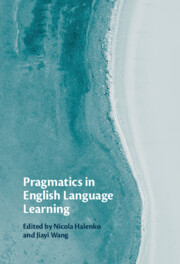Book contents
- Pragmatics in English Language Learning
- Pragmatics in English Language Learning
- Copyright page
- Contents
- Figures
- Tables
- Contributors
- Foreword
- Acknowledgements
- Introduction
- 1 Second Language Pragmatics
- Part I Pragmatics in Action
- 2 ‘Mind Your Language’
- 3 Pragmatic Development in Request Performance
- 4 Placing Oneself in the Reader’s Shoes
- 5 ‘Hey, You, Can I Loan Your Yellow Pencil?’
- Part II Instructed Pragmatics
- Index
- References
3 - Pragmatic Development in Request Performance
A Cross-Sectional Study of Greek EFL Learners
from Part I - Pragmatics in Action
Published online by Cambridge University Press: 29 September 2022
- Pragmatics in English Language Learning
- Pragmatics in English Language Learning
- Copyright page
- Contents
- Figures
- Tables
- Contributors
- Foreword
- Acknowledgements
- Introduction
- 1 Second Language Pragmatics
- Part I Pragmatics in Action
- 2 ‘Mind Your Language’
- 3 Pragmatic Development in Request Performance
- 4 Placing Oneself in the Reader’s Shoes
- 5 ‘Hey, You, Can I Loan Your Yellow Pencil?’
- Part II Instructed Pragmatics
- Index
- References
Summary
The present study uses a cross-sectional design in order to systematically investigate interlanguage pragmatic performance and to shed more light on L2 pragmatic development. It analyses and compares learners’ production across three proficiency levels, and examines whether learners who receive classroom instruction in a FL context show pragmalinguistic development in making requests as their English language proficiency improves. The data are collected through interactive role-plays and the analysis focuses on request head acts, internal modification, and request perspective. The results suggest that, although there is some development with increasing proficiency, even the advanced learners’ performance lags far behind native speakers in the pragmatic areas examined. The study identified specific stages in the development of learners’ requests; however, the predominance of directness across all levels and the reversed developmental trend of request perspective pointed towards the influence of the L1 on the learners’ pragmalinguistic performance, particularly in the foreign language context.
Information
- Type
- Chapter
- Information
- Pragmatics in English Language Learning , pp. 57 - 83Publisher: Cambridge University PressPrint publication year: 2022
References
Accessibility standard: Unknown
Why this information is here
This section outlines the accessibility features of this content - including support for screen readers, full keyboard navigation and high-contrast display options. This may not be relevant for you.Accessibility Information
- 1
- Cited by
